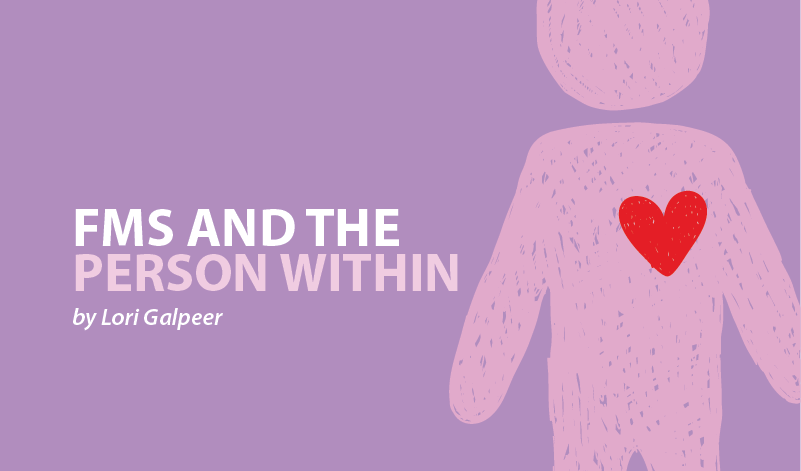
Like most experiences in life, the difficult or challenging ones can be a source of learning and personal growth. Ask most who have had a chronic illness for a lengthy amount of time, and they can attest to the fact a grieving process is necessary toward learning to cope. The purpose is to move forward from denial, fighting against oneself, depression and anger to a state of acceptance.
The process begins first with acknowledging that you do, in fact, have fibromyalgia. I was fortunate because my primary care physician saw the symptoms and diagnosed me. I say “fortunate” because most have to go through different doctors and suffer for many years before receiving a proper diagnosis. I was dealing with a divorce at the time, and remember having fatigue that stayed with me most of the time. I thought nothing of it because I was working a lot, and expending a lot of emotional energies. Sleeping or resting an entire weekend seemed logical, especially since my energy levels returned at times. After a car accident, my symptoms escalated and I began having chronic backaches and non-endometrial related pelvic pain, neither of which responded to therapies such as heat, meditation, chiropractic manipulation and massage.
I continued on this path for a year-and-half until the symptoms became more constant. Without resolution for my pain, I agreed to see a rheumatologist. I maintained a stoic demeanor in order to acquire the facts first, with time for the emotions to flow later. My rheumatologist alerted me that I would have to start working part-time, something that I had not anticipated. Given the fact I had worked for the same supervisor for 10 years, my job was secure; however, the fluctuations in attendance still came with occasional frustrations. The guilt I felt led me to push myself harder, which ended up being a disaster.
Getting up before 11 a.m. was difficult. Mid-afternoon to evening were my best working hours. The few times I was able to work a full-day usually led to bed rest the following day. When research funding and changes occurred, my part-time work was obsolete. In response I decided to pursue administrative work. Multiple attempts led me to quit because the demands were too much. My last job was in research, but it was not of a clinical nature. I was proud of myself that my fibro fog rarely interfered. However, continual typing aggravated my neck and shoulders.
My rock bottom moment occurred when my beloved dad-in-law lapsed into a coma. I was at the hospital almost daily, and would do the work from home. Oddly, my presence was found to be more important. I was stunned when my supervisor told me he “understood fibromyalgia” because a family friend had it. In the next breath I was told “to go ahead and quit” — he had already hired two students to work the summer.
At this point, I was emotionally and physically drained. The angst of not finding employers who could accommodate my career was just as painful as the fact I was in the worst health of my life.
***
Please check back next week for part two of “Learning to Accept FMS,” where I will discuss delving into your emotions.
Note: Fibromyalgia News Today is strictly a news and information website about the disease. It does not provide medical advice, diagnosis, or treatment. This content is not intended to be a substitute for professional medical advice, diagnosis, or treatment. Always seek the advice of your physician or other qualified health provider with any questions you may have regarding a medical condition. Never disregard professional medical advice or delay in seeking it because of something you have read on this website. The opinions expressed in this column are not those of Fibromyalgia News Today, or its parent company, BioNews Services, and are intended to spark discussion about issues pertaining to fibromyalgia.


I’m so sorry that no one was there for you during your defining fibro time. You have a tremendous story to tell because this is a disability that is unseen and more need to understand the ups and downs that affect your daily well being.
Hi Lori!
I can definitely relate to your struggles, except that my former supportive husband started withdrawing affection the last 6 years of our marriage because he couldn’t deal with my pain and not being able to do anything to help. He could have helped in other ways, but I don’t blame him for wanting to get out. For the last 2.5 years, making money is something I have to do alone now. I work as a medical coder and had 7 years experience when I finally was asked to leave my last office job. I found a company that hires coders as contractors to work coding in your field from home. Being a contractor means that I can set my own schedule, but I do have to commit how many hours I can work on each client and not over-commit. They have been great about the fluctuation in work time and never say a word about it – even when I don’t hit my commitment hours. They understand the condition and its limitation. Unfortunately, this means that I also only get paid for what I produce, and when I am tired or in pain, I work slower. I did try to start a network marketing business 7 years ago – thinking that my husband’s friends would support me in that effort; however, he apparently was portraying me as some beast, so they never supported my biz other than the 8 people who became my customer to give me some residual income. I chose a business that doesn’t require parties or selling a product. We provide electricity and natural gas services to a few states and have now also moved into mobile phone service, home security and policies that include identity theft protection, online medical advice, credit management, etc. I am learning all the new stuff so I can get back to this business. I think it is still the most promising way for me to have retirement and maybe even disability for a while. Thanks for your insightful information on how difficult it is to maintain a career and reduce stress. I had started to think that it was something wrong with me that I couldn’t force myself to work more than 20 hours per week and have some weeks where I felt I was doing all I could at 15 hours/week. My family turned away help and relationship because my sister convinced my kids that she has a friend with fibro who works full time without a problem. I tried to make them understand that severity of symptoms varies widely, but they had already been convinced and aren’t willing to talk to me to find out the truth about my symptoms. That means that only my church is there to help out when I need food or gas money or shelter. I spent the last 4 months in 2016 homeless because my kids had me committed to an inpatient psyche facility because they thought I took too many pain relievers. This facility took away all of my meds and let me suffer through withdrawal because they think that if you suffer withdrawal, then you won’t get ‘hooked’ again. I was taking legally prescribed opiates in the doses as given except for the few days when I could drop one or two doses to lessen the effects on long term possible side effects. Life can be brutal when people have no close friend or family that they have literally seen what we suffer through to get it. My kids and sister only saw me on birthdays and holidays, so they have no idea what my life is like but thought taking my healthcare into their hands was for my best….. Anyways – thanks for bringing attention to what we face and how we can solve it! It is much appreciated to know you aren’t alone with stuff like this.
Hello Lori,
I can relate all too well to your situation as a 49 year old Fibromyalgia sufferer working in a full time career that can be demanding more times than now, when controlling my body aches and managing the debilitating fatigue can be a full time distraction and job in and of itself. There have been many times I believed I reached my limits and would have to call it quits, but I have managed to push myself through another day. Your statement, “the guilt I felt led me to push myself harder, which ended up being a disaster” resonates greatly with me as I feel like I have more to prove that I’m not a liability but an asset to my organization. It exacerbates my fatigue to keep this psychological weight and pressure on me. I’m glad you are addressing the issue of maintaining employment with a chronic illness like fibromyalgia. Look forward to your other posts.
I am glad that my comments were of some sort of support. I am sorry that you are at the point where you have to push to get through the day. Unfortunately, sounds like time to start looking into options, such as part-time or other employment at least to know your next step should you decide to call it quits with your current position. FYI, I plan on dedicating another article to discrimination and employment.
Excellent article Lori, can’t wait to read part 2!